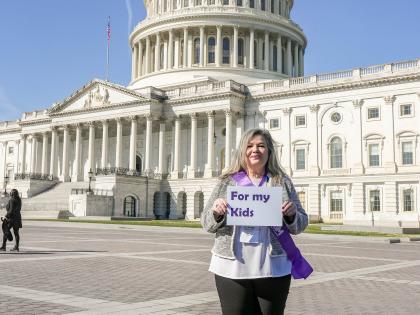New Hampshire State Alzheimer’s Plan Overview
In March 2014, New Hampshire’s legislature established a Subcommittee on Alzheimer’s Disease and Related Dementia through the passage of HB 1572-FN. The Subcommittee includes representatives from care provider organizations, state agency officials, law enforcement officials, state legislators, caregivers, and other individuals impacted by Alzheimer’s. New Hampshire Alzheimer’s Disease & Related Dementias Sub-Committee Recommendations was published in 2013 and updated in 2015.
New Hampshire 2026 Policy Priorities

Integrate Alzheimer’s in Public Awareness Campaigns
As New Hampshire’s population ages and the number of people with dementia grows, a robust public health response is needed to mitigate the future impact of the disease. It is critical that residents across the state understand the importance of brain health, risk reduction strategies and early detection and diagnosis. The Alzheimer’s Association is calling on state lawmakers to enact legislation that incorporates Alzheimer’s and dementia into existing public health outreach programs directed at the public and health care providers.

Improve Access to Biomarker Testing
With the historic Food and Drug Administration (FDA) approval of treatments that slow the progression of Alzheimer’s in the early stages, early detection and diagnosis are even more critical to ensure individuals receive the most benefit at the earliest point possible. Biomarkers offer one of the most promising paths to improve dementia detection, diagnosis and treatment. Yet these critical tests remain out of reach for many as insurance coverage is failing to keep pace with innovations and advancements in treatments. The Alzheimer’s Association is urging state lawmakers to expand insurance coverage of comprehensive biomarker testing. Without this legislation, dementia diagnoses may take up to two years, increasing the long-term costs to the individual, family and the state.
New Hampshire State Advocacy Day
The New Hampshire Advocacy Day is your chance to be a part of influencing change and advocating to ensure that the needs of people living with dementia — and their caregivers — are a priority in our state. Throughout the day, you will hear directly from legislative champions fighting for Alzheimer’s and dementia care, get insider updates on critical bills that impact our community, meet face-to-face with your state legislators, and connect with passionate advocates who understand the journey.
Sign Up to Learn About Advocacy Opportunities in New Hampshire

Find My Chapter
Together, we’re making an impact. Find an Alzheimer’s Association chapter in your community for more ways to engage.
Contact Us
State Affairs Contact: Jenny Horgan
Phone: 603.403.3327
Email: jchorgan@alz.org
26,500
people living with Alzheimer’s in New Hampshire
48,000
Granite Staters are providing unpaid care
$363 Million
Medicaid cost of caring for people living with Alzheimer’s (2025)
462
deaths from Alzheimer’s in 2022
17%
in hospice with a primary diagnosis of dementia
20.5%
increase of geriatricians in New Hampshire needed to meet the demand in 2050
Resources to Drive Change in New Hampshire
The following resources developed by AIM and the Alzheimer’s Association will help you learn more about the issues impacting people living with Alzheimer’s and their caregivers, how New Hampshire policymakers are addressing these gaps, and how you can help drive change.